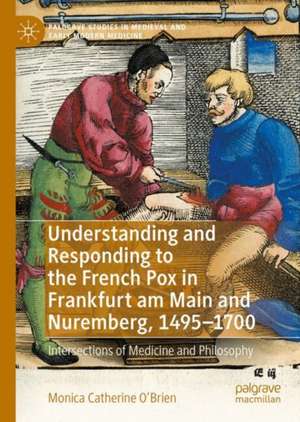Understanding and Responding to the French Pox in Frankfurt am Main and Nuremberg, 1495-1700: Contagion, Practicality, and Morality: Palgrave Studies in Medieval and Early Modern Medicine
Autor Monica Catherine O'Brienen Limba Engleză Hardback – 11 ian 2025
Preț: 606.27 lei
Preț vechi: 666.24 lei
-9% Nou
Puncte Express: 909
Preț estimativ în valută:
116.01€ • 121.37$ • 96.37£
116.01€ • 121.37$ • 96.37£
Carte nepublicată încă
Doresc să fiu notificat când acest titlu va fi disponibil:
Se trimite...
Preluare comenzi: 021 569.72.76
Specificații
ISBN-13: 9783031469244
ISBN-10: 3031469240
Pagini: 300
Ilustrații: Approx. 300 p. 25 illus.
Dimensiuni: 148 x 210 mm
Ediția:2024
Editura: Springer International Publishing
Colecția Palgrave Macmillan
Seria Palgrave Studies in Medieval and Early Modern Medicine
Locul publicării:Cham, Switzerland
ISBN-10: 3031469240
Pagini: 300
Ilustrații: Approx. 300 p. 25 illus.
Dimensiuni: 148 x 210 mm
Ediția:2024
Editura: Springer International Publishing
Colecția Palgrave Macmillan
Seria Palgrave Studies in Medieval and Early Modern Medicine
Locul publicării:Cham, Switzerland
Cuprins
1. Introduction.- 2. Contagion in the Community, Contagion in Theory: Medical and Governmental Understandings of French Pox Transmission, 1495-1630.- 3. Medical and Municipal Authorities and the Power of the Patient.- 4. Moral Ideas, Practical Issues: Religious and Charitable Responses to the French Pox, 1495-1630.- 5. Protecting the Healthy and Serving the Sick: Municipal Institutions for the Poxed, 1495-1700.- 6. From ‘the French Pox’ to ‘Venereal Disease’: The Nuremberg Council and the Poxed Poor, 1650-1700.- 7. Suffering and Complaint: Constructing Identity as a Victim of the Pox.- 8. Conclusion.
Notă biografică
Monica O’Brien’s research explores the medical, social, and emotional histories of epidemic disease and illness in late medieval and early modern Europe. She obtained her PhD in History from the University of Glasgow in 2019 where her research was funded by a Leverhulme Trust Doctoral Scholarship. She was a postdoctoral fellow at the Herzog August Bibliothek, Wolfenbüttel, where her research focused on religious emotions and responses to syphilis. Monica is an Effective Learning Adviser at the University of Glasgow, where she continues researching as well as developing and teaching new courses including Theory for the Terrified and History of Argument to support students in developing academic skills, such as criticality.
Textul de pe ultima copertă
This book traces how city councils, medical practitioners and urban society developed their understandings of and responses to the ‘French pox,’ a pandemic that swept through Europe during the winter of 1494-1495, and is now more commonly known as syphilis. Focusing on the disease in Frankfurt am Main and Nuremberg, two major cities in early modern Germany (1495-1700), and using a range of primary sources, including government records, medical publications, and writings of the sick, the author argues that the city councils’ responses to the disease, the orders that they issued to control its spread and their provision of poor relief, were driven by three key factors: contagion, practicality (considerations on finances and resources), and morality. Their understandings of these elements led to a response that prioritised the provision of aid to support the sick as a way to control the disease, protect the economy and population, and satisfy moral beliefs. Moreover, the book demonstrates the significant and enduring influence of non-sexual contagion theories - the belief that the French pox spread through mechanisms like shared clothing, cutlery, and money - in law, medical thinking, and the self-portrayals of the sick. Making an important contribution to our understanding of early modern contagion theories and their role in municipal authorities’ responses to disease, this timely book will provide new insights for early modern historians researching the social history of medicine and welfare.
Monica O’Brien’s research explores the medical, social, and emotional histories of epidemic disease and illness in late medieval and early modern Europe. She obtained her PhD in History from the University of Glasgow in 2019 where her research was funded by a Leverhulme Trust Doctoral Scholarship. She was a postdoctoral fellow at the Herzog August Bibliothek, Wolfenbüttel, where her research focused on religious emotions and responses to syphilis. Monica is an Effective Learning Adviser at the University of Glasgow, where she continues researching as well as developing and teaching new courses including Theory for the Terrified and History of Argument to support students in developing academic skills, such as criticality.
Monica O’Brien’s research explores the medical, social, and emotional histories of epidemic disease and illness in late medieval and early modern Europe. She obtained her PhD in History from the University of Glasgow in 2019 where her research was funded by a Leverhulme Trust Doctoral Scholarship. She was a postdoctoral fellow at the Herzog August Bibliothek, Wolfenbüttel, where her research focused on religious emotions and responses to syphilis. Monica is an Effective Learning Adviser at the University of Glasgow, where she continues researching as well as developing and teaching new courses including Theory for the Terrified and History of Argument to support students in developing academic skills, such as criticality.
Caracteristici
Sheds light on the development of municipal health care systems in Frankfurt and Nuremberg Illustrates the complex responses to the French pox Demonstrates the significant and enduring influence of non-sexual contagion theories









